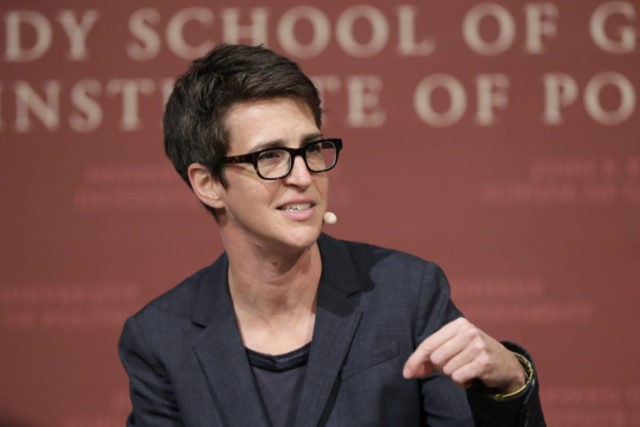MSNBC primetime anchor Rachel Maddow is under fire for antisemitism after falsely accusing judicial nominee Steven Menashi of racism.
While it may be a bridge too far to accuse her of antisemitism, merely because Menashi is Jewish, Maddow is guilty of smearing him as a racist based on distortions of his writings so egregious that it is clear she either never read the articles she cites; did not understand them; or — worst of all — read them, understood them, and misconstrued them.
President Donald Trump announced this week he would nominate Menashi to the U.S. Court of Appeals for the Second Circuit. That is the context in which Maddow launched her false attack on Menashi as a racial extremist.
In 2010, Menashi published a law review article in the University of Pennsylvania Journal of International Law titled, “Ethnonationalism and Liberal Democracy.” The article sought to defend Israel from criticism that it violates democratic norms because it adopts the Jewish community as the basis for its national identity (though it grants equal rights to Arabs and other minorities).
Menashi, who is himself a Jew of Iraqi origin, argued that ethno-nationalism and democracy can often go hand-in-hand. He was responding to arguments from post-nationalist scholars like historian Tony Judt, who favored the dismantling of Israel. (The weakness of “liberal universalism,” he pointed out, at least for Jews, was that it had not prevented the Holocaust.)
Menashi also pointed out: “The idea that a sovereign democratic government represents a particular ethnonational community has its root in the principle of ‘self-determination of peoples’ espoused at the foundation of the League of Nations and the United Nations, and it has been ratified by subsequent practice.” (The principle of self-determination was articulated forcefully by U.S. President Woodrow Wilson, who happened to be a Democrat.) Menashi also noted that the same principles that justified Palestinian nationhood justified Israeli nationhood.
Toward the end of the paper, Menashi noted the problem that ethnically heterogeneous states often have weaker common political and social institutions. He argued that “modern democratic thinking” failed to appreciate that successful liberal democracies often emerged within a “particularistic national context.”
(He did not discuss the U.S., but this argument, applied to the U.S., would note that the liberal American traditions of religious freedom and tolerance emerged from within dissident Protestant religious sects that thrived in England and few other places. Or, to put it more whimsically: without the 17th-century Puritans, there would be no Gay Pride parades today.)
Menashi concluded: “Liberal democracy requires a national community if it is to become more than an ineffectual abstraction.” His view is not extreme: it is entirely consistent with the idea of an inclusive American nationalism.
In her segment on Menashi on Thursday, Maddow used a selective reading of his article to accuse him of being a racial extremist. She quoted his article selectively, and inaccurately, claiming that Menashi had argued that “democracy can’t work unless the country is defined by a unifying race.” At no point did Menashi ever say that or discuss “a unifying race.” Later, she characterized Menashi’s argument as saying that “you can’t have a country that works if you’ve got all sorts of different people in it.” She also said he was arguing for “racial purity” and described his article as “slightly bloodcurdling.”
The network itself also tweeted the false accusation, which Maddow retweeted:
The author of a paper which argues that democracy requires ethnic homogeneity to thrive, and that ethnic diversity weakens a nation state, is Trump’s nominee for a federal judgeship. https://t.co/3UlBdfdaxZ
— MSNBC (@MSNBC) August 16, 2019
Maddow reacted to criticism by doubling down on Friday, tweeting selective quotes from the article:
Per our segment last night on Trump's new federal appeals court nominee, Steven Menashi, here's some of what he has to offer on "Ethnonationalism and Liberal Democracy": pic.twitter.com/mPvFxu9ixq
— Rachel Maddow MSNBC (@maddow) August 16, 2019
She also referred to a 2002 book review for the Hoover Institution at Stanford University in which Menashi quoted an urban legend about U.S. General John Pershing using “bullets dipped in pig fat” to execute Islamic militants.
If Maddow, or her staff, had read the whole article, they would have noted that Menashi was arguing against such a brutal approach in the War on Terror. He quoted conservative thinker Victor Davis Hanson: “‘Brute aggression,'” it seems, cannot match what arises ‘when free men march unabashedly toward the heartland of their enemy in hopes of saving the doomed, when their vast armies are aimed at salvation and liberation, not conquest and enslavement.'”
Maddow, who is a Rhodes Scholar, is regarded as an intellectual leader of the contemporary American left. But she spent the first two-plus years of the Trump presidency chasing a conspiracy of Russian collusion, and has now used ignorant, functionally illiterate, and intellectually dishonest tactics to smear a judicial nominee. It seems unlikely she will apologize for smearing Menashi. Regardless, it is impossible to regard her as an “intellectual” ever again.
Joel B. Pollak is Senior Editor-at-Large at Breitbart News. He earned an A.B. in Social Studies and Environmental Science and Public Policy from Harvard College, and a J.D. from Harvard Law School. He is a winner of the 2018 Robert Novak Journalism Alumni Fellowship. He is also the co-author of How Trump Won: The Inside Story of a Revolution, which is available from Regnery. Follow him on Twitter at @joelpollak.

COMMENTS
Please let us know if you're having issues with commenting.